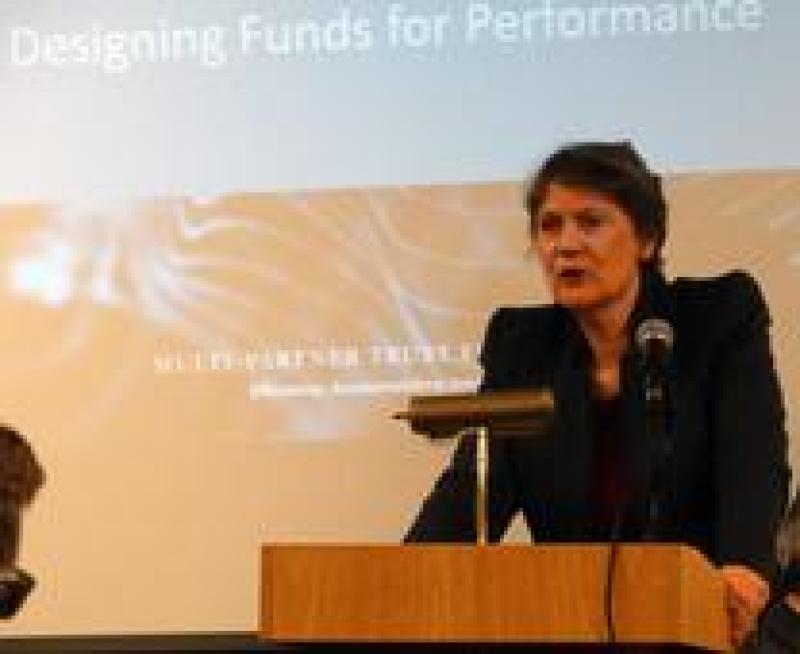

The MPTF Office organized a one-day Symposium on 26 March to discuss how to design pooled funds for performance. Held under the auspices of the UN Working Group on Transition, the symposium was opened by Helen Clark, UNDP Administrator and Chair of the UNDG. The outcome of the symposium is reflected in the working draft of the “Designing Funds for Performance” manual. Read more …
The MPTF Office organized a one-day Symposium on 26 March to discuss how to design pooled funds for performance. Held under the auspices of the UN Working Group on Transition, the symposium was opened by Helen Clark, UNDP Administrator and Chair of the UNDG. The outcome of the symposium is reflected in the working draft of the “Designing Funds for Performance” manual.
Pooled funds are investment vehicles designed to support transformative change. Well-designed, capitalized and operationalized pooled funds can act as gravity centers to improve aid effectiveness, increase alignment among a wide range of actors and reduce costs and risks for donors, country governments and implementing partners. The role of pooled funding mechanisms is likely to grow in the coming years, as development finance architecture evolves rapidly. The adoption of Sustainable Development Goals (SDGs) will be reinforcing the need for multi-partner financing aligned with specific global issues.
The UN and its partners have accumulated a wealth of experience over the past decade with system-wide development, humanitarian and recovery pooled financing mechanisms. The success of issue-based UN pooled financing mechanisms, however, will depend on the quality of fund design and administration, fund operations, and fund implementation. To leverage the potential benefits and limit the potential drawbacks, the way in which funds are designed matters. Upfront investment in a fund design will save time, lower transaction costs and increase its impact. A dynamic process of fund design, operation and implementation ensures that pooled funds are both financing and learning instruments, fit for purpose in support of transformative change.
The MPTF Office has developed a manual to design pooled funds for performance. This manual builds on the efforts of a number of inter-agency working groups under the United Nations (UN) system. In particular, it forms part of the biennial work-plan 2015–2016 of the UN Working Group on Transition. It also builds on the work of the UNDG Business Operations Working Group on risk management, the recent UNDG standard operating procedures for countries adopting the Delivering as One approach, and the Integrated Working Group’s efforts on enhancing UN integration. The manual draws on the UN’s experience with over 100 pooled funds administered by the MPTF Office and supports recommendations from several thematic studies conducted by the MPTF Office, in partnership with concerned UN agencies, on how to better leverage pooled financing mechanisms to improve UN coherence and development effectiveness.
The manual also benefitted from valuable comments by a range of UN and contributing partners through a one day Symposium held on the 26th March 2015 in New York. Opened by Helen Clark, the symposium was moderated by Jens Wandel, Assistant Administrator and Director of UNDP’s Bureau of Management. Speakers at the launch also included Ambassadors H.E. Mr. Hiroshi Minami of the Japanese Mission and H.E. Mr. Martin Shearman of the UK Mission and Yannick Glemarec, the MPTF Office Executive Coordinator. Presentations made during the day are available here.
The manual does not provide a one-size-fits-all template, but serves as a non-prescriptive reference document to accompany the fund design process. The manual is structured in five parts: part 1 sets out a methodology for assessing the added value of a fund based on a financing strategy; part 2 describes the steps involved in developing the fund’s results framework to guide its allocation decisions; part 3 discusses how to translate the fund results framework into the MPTF Office’s results-based management (RBM) system; part 4 articulates an approach for developing a fund risk management strategy, including incorporating risk assessments into the fund design stage for pooled funds in complex post-crisis situations; and part 5 describes the fund governance architecture.
The manual, still in a draft version, is meant to spur a productive conversation and benefit from the partners’ comments and suggestions. After a period of careful consideration and revision, based on received feedback, the final version will be released next June. Comments on the draft manual can be sent to the MPTF Office, to fiona.bayat@undp.org and eva.saenz@undp.org by 15th May 2015.